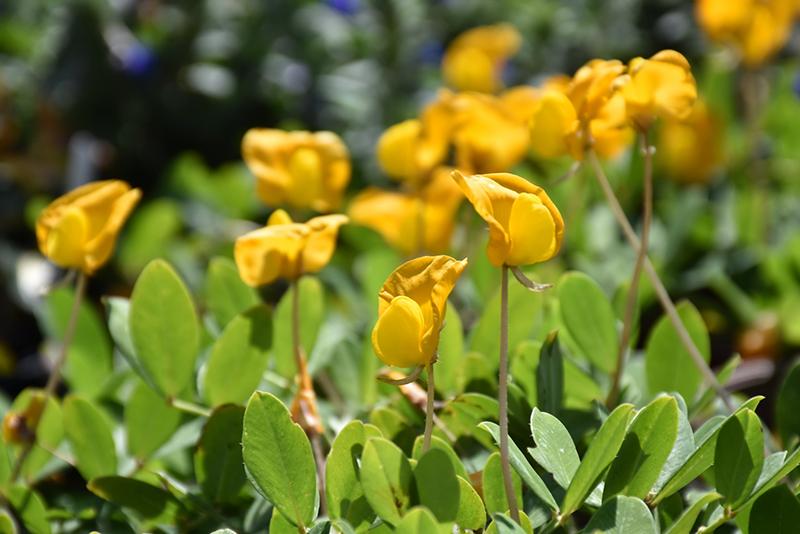Height: 12 inches Spread: 12 inches
Sunlight:
Hardiness Zone: 8b Other Names: Peanut Grass, Perennial Peanut Description: A beautiful ornamental ground cover that can be used as a replacement for grass; forming dense mats of rhizomes, stems rise above, providing dense coverage; edible yellow flowers show off among deep green foliage; drought tolerant once established Ornamental Features Rhizoma Peanut features dainty yellow pea-like flowers rising above the foliage from mid spring to mid fall. Its oval compound leaves remain emerald green in color with pointy creamy white spines throughout the year. Landscape Attributes Rhizoma Peanut is an herbaceous evergreen perennial with a ground-hugging habit of growth. Its relatively fine texture sets it apart from other garden plants with less refined foliage. This is a relatively low maintenance plant, and can be pruned at anytime. It has no significant negative characteristics. Rhizoma Peanut is recommended for the following landscape applications; Planting & Growing Rhizoma Peanut will grow to be about 12 inches tall at maturity, with a spread of 12 inches. Its foliage tends to remain dense right to the ground, not requiring facer plants in front. It grows at a medium rate, and under ideal conditions can be expected to live for approximately 5 years. As an evegreen perennial, this plant will typically keep its form and foliage year-round. This plant does best in full sun to partial shade. It does best in average to evenly moist conditions, but will not tolerate standing water. It is not particular as to soil type or pH. It is somewhat tolerant of urban pollution. This species is not originally from North America. It can be propagated by cuttings. Rhizoma Peanut is a fine choice for the garden, but it is also a good selection for planting in outdoor pots and containers. Because of its spreading habit of growth, it is ideally suited for use as a 'spiller' in the 'spiller-thriller-filler' container combination; plant it near the edges where it can spill gracefully over the pot. Note that when growing plants in outdoor containers and baskets, they may require more frequent waterings than they would in the yard or garden.![]()
![]()
![]()
![]()
![]()
![]()
![]()
![]()
![]()
![]()
![]()
top of page
Louie's Nursery Menifee - Plant Finder
Characteristics
Applications
Features & Attributes
This tool is an online resource representing many of the varieties that we carry over the course of the season, and is intended for informational purposes only. Inventory varies seasonally, so we cannot guarantee that every plant will be in stock at all times - please contact the store directly for current availability. It does not include our entire selection of plants, so be sure to visit our store to see varieties that may not be represented on this list.
bottom of page
